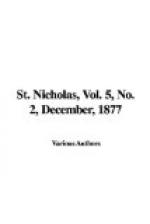And the Three Kings rode through the gate
and the guard,
Through the silent street,
till their horses turned
And neighed as they entered the great
inn-yard;
But the windows were closed, and the doors
were barred,
And only a light in the stable
burned.
And cradled there in the scented hay,
In the air made sweet by the
breath of kine,
The little child in the manger lay,—
The child that would be king one day
Of a kingdom not human but
divine.
His mother, Mary of Nazareth,
Sat watching beside his place
of rest,
Watching the even flow of his breath,
For the joy of life and the terror of
death
Were mingled together in her
breast.
They laid their offerings at his feet;
The gold was their tribute
to a king;
The frankincense, with its odor sweet,
Was for the priest, the Paraclete,
The myrrh for the body’s
burying.
And the mother wondered and bowed her
head,
And sat as still as a statue
of stone;
Her heart was troubled, yet comforted,
Remembering what the angel had said
Of an endless reign and of
David’s throne.
Then the Kings rode out of the city gate,
With the clatter of hoofs
in proud array;
But they went not back to Herod the Great,
For they knew his malice and feared his
hate,
And returned to their homes
by another way.
ROWING AGAINST TIDE.
By Theodore Winthrop.
[The following hitherto-unprinted fragment by Theodore Winthrop, author of “John Brent,” “The Canoe and the Saddle,” “Life in the Open Air,” and other works, was intended by him for the first chapter of a story called “Steers Flotsam,” but it has an interest of its own, and is a complete narrative in itself.
Perhaps there are many of our young readers who do not know the history of that brave young officer who, one of the very first to fall in the late war, was killed at Great Bethel, Virginia, June 10, 1861. He was born at New Haven, Connecticut, in September, 1828. He was a studious and quiet boy, and not very robust. From early youth he had determined to become an author worthy of fame, but he tore himself away from his beloved work at the call of his country just as he was about to win that fame, leaving behind him a number of finished and unfinished writings, most of which were afterward published.
He could handle oars as well as write of them, could skate like his hero in “Love and Skates,” and was good at all manly sports. He traveled much, visited Europe twice, lived two years at the Isthmus of Panama, and returning from there across the plains (an adventurous trip at that time), learned in those far western wilds to manage and understand the half-tamed horses and untamed savages about whom he writes so well. This varied experience gave a freedom and power to his pen that the readers of the st. Nicholas are not too young to perceive and appreciate.]




